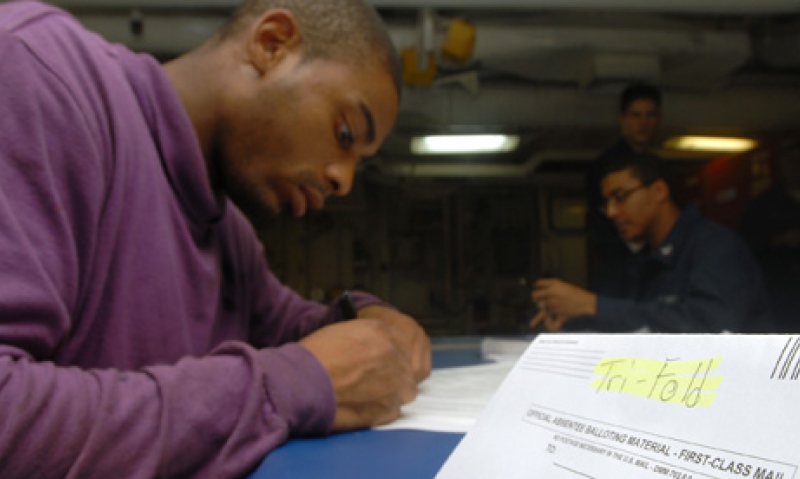
Congress made an effort last year, but problems persist for active-duty troops stationed overseas.
A decade removed from the dramatic 2000 general election when a handful of votes decided the U.S. presidency - including many U.S. Navy absentee ballots that were previously rejected and then counted later - the problem of polling active-duty troops overseas is far from resolved.
According to a 2009 editorial in New York's Newsday newspaper, "As many as one in four ballots cast by overseas military voters went uncounted in last year's presidential election. That's a terrible record and an insult to servicemen and women."
Lt. Col. Jeffrey Mark of the Nevada Army National Guard, recollecting his voting experience while serving in Baghdad during the 2008 elections, said a major problem was simply getting various state ballots to active-duty personnel in theater. "They were moving us from building to building," he recently explained. "The postal folks had our personal mail going to about six different units. It was tumultuous trying to get mail even from our homes, so taking part in the primaries was a very difficult task for us. That continued until the general election."
Even when ballots were delivered in time to be cast and returned, bureaucratic obstacles had to be overcome, including state-by-state voter annotation, signatures and postmarking requirements. Voting assistance officers were hired to help members of the military cast their ballots. Mark said the officers had a tall order.
"They had to be trained, had to learn the system, and had to learn what units were located where. As soon as they got that settled, the units were either demobilized or were moved to other locations. My unit had 13 soldiers from Nevada with me. Six of us were able to vote, and that was like pulling teeth."
Clearly, votes from servicemembers count - and can count heavily - in determining the political fate of the nation as a whole, as well as at the state, county and local levels. Moreover, every eligible U.S. citizen, including a deployed servicemember, has the right to cast a ballot and have it count.
Last year, Congress enacted the Military and Overseas Voter Empowerment Act (MOVE), a law directed at states and designed to prevent disenfranchisement of overseas and military voters. In brief, the 2009 legislation:
- Eliminates notarization requirements for overseas ballots in the states that still require them and relaxes certain registration rules imposed specifically on voters subject to the Uniformed and Overseas Citizens Absentee Voting Act.
- Requires all states to make voter registration and absentee ballot applications and general election information available electronically. The law also mandates that all states make a standardized federal write-in absentee ballot available online when official ballots do not arrive in time.
- Requires all states to mark a 45-day period for absentee ballots to be distributed to voters and returned.
The MOVE provisions sound straightforward enough, but some states are having a tough time carrying them out. Officials cite election-cycle schedules that preclude meeting the 45-day ballot "round- trip" requirement. Changing schedules, some argue, might require amendments to state constitutions.
Some state officials complain that switching from a traditional paper ballot system to an absentee voter-accommodating electronic one - the ultimate solution - is too costly, at least in the current economic climate.
MOVE offers a remedy to reluctant states in the form of Justice Department-issued waivers which can extend the period allowed for the return of overseas ballots. Each state's waiver application is considered individually.
Tim Tetz, legislative director of The American Legion, says Legionnaires need to fight for the rights of service personnel to vote absentee and have it count.
"Every single Legionnaire needs to be out there and saying (to their state officials) ‘What are you doing to help our military and our veterans vote?' There is nothing more sacrosanct than your right to vote. It's been our position from the beginning to defend that right that they are defending with their blood, sweat and tears."
- Citizenship

